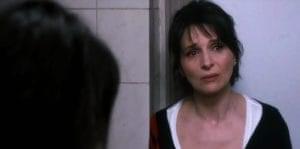
French director Claire Denis created her own niche of fans with thoughtful dramas like Beau Travail, The Intruder, 35 Shots of Rhum, and White Material. She now returns in top form, after two documentaries and one short, with an engrossing story adapted from the 1977 text A Lover’s Discourse: Fragments by Roland Barthes. Juliette Binoche is an unquiet, emotionally unstable Parisian artist who desperately needs true love to survive. Isabelle is indeed a difficult divorcee who dreams of the perfect love. However, the men she picks are usually married, volatile in their emotions and decisions, and not so accessible as she would like them to be.
At the same time that she closes one door to the despicable banker Vincent Briot (Xavier Beauvois, director of Of Gods and Men at his best), who is only interested in the pleasures of life and informs her he could never leave his wife, she opens another one to a successful younger actor (Nicolas Duvauchelle), who seems as nearly disorientated with his life as she is with hers. There’s also Mathieu (Philippe Katerine), a cordial, wealthy and single neighbor who keeps inviting her to spend some days with him in an estate in the countryside. She doesn’t pay so much attention to him as she keeps searching for something spicier in her relationships.

“…the men she picks are usually married, volatile in their emotions and decisions, and not so accessible…”
Social class is also a factor that weighs in her evaluation of men. Hence, her preference goes to Marc (Alex Descas), a circumspect 50-year-old fellow artist, instead of the ordinary Sylvain (Paul Blain), with whom she flirted one night just for fun. She has nothing to lose in probing different relationships, but life can get dramatically tortuous when you don’t get what you’re looking for.
Lonely, frustrated, and somewhat depressive, Isabelle can’t be blamed for feeling jealous of one of her best friends, Ariane (Sandrine Dumas), whose amorous life is better than ever. Maybe that’s why she embarked on inconsequent sexual encounters with her ex-husband François (Laurent Grévill), who now takes care of their 10-year-old daughter. Isabelle acts with indifference in regard to the kid. Her general dissatisfaction and inconstant mood consume so much energy from her that she can’t help crying alone.

“…Binoche is an unquiet, emotionally unstable Parisian artist who desperately needs true love to survive.”
Be aware that this is not a romantic film. It’s exactly the opposite. The self-assured Ms. Denis, who collaborated with Christine Angot in the script, takes the path of success by making it deliciously complex and witty. Her detailed observations are meticulously transposed to the screen through a fantastic Binoche, incredibly compelling in her performance, and the outstanding supporting cast.
The finale is simultaneously droll and trenchant, with a 10-minute appearance from Gerard Depardieu as a spiritual counselor. His own relationship with his partner also reached an impasse. Yet, he talks in circles until drawing a smile from Isabelle out of a false hope. Can she let the sunshine into her life? I have serious doubts. Denis’ most diaphanous work to date is a subtle, powerful, and intelligent look at human relationships and society.

Let The Sunshine In (2018) Directed by Claire Denis. Written by Christine Angot and Claire Denis. Starring Juliette Binoche, Xavier Beauvois, Nicolas Duvauchelle, Philippe Katerine, Alex Descas, Gerard Depardieu.
8 out of 10

